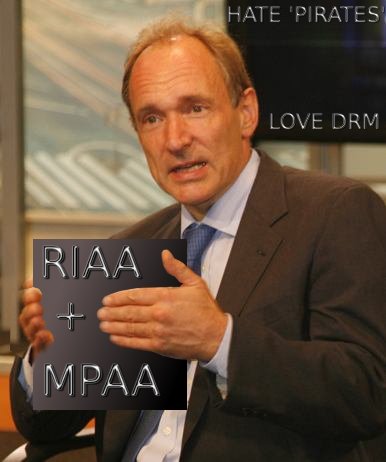

Source: Original from John S. and James L. Knight Foundation, modified by Techrights
DECADES ago Tim Berners-Lee created what we now know as the "World Wide Web". Unlike the Internet, this was not a military project. It was harboured by CERN (science) at the time. Unlike the Internet, the World Wide Web was not a tool of power over people. It was created to help Tim Berners-Lee share his physics paper with other people, collaborating and pushing towards scientific improvement.
On Monday, the W3C announced that its Director, Tim Berners-Lee, had determined that the "playback of protected content" was in scope for the W3C HTML Working Group's new charter, overriding EFF's formal objection against its inclusion. This means the controversial Encrypted Media Extension (EME) proposal will continue to be part of that group's work product, and may be included in the W3C's HTML5.1 standard. If EME goes through to become part of a W3C recommendation, you can expect to hear DRM vendors, DRM-locked content providers like Netflix, and browser makers like Microsoft, Opera, and Google stating that they can now offer W3C standards compliant "content protection" for Web video.
We got news on Wednesday from Boing Boing that the World Wide Web Consortium is going to add DRM to HTML 5. There’s not much information available right now on how this will work or how many browser developers will go along with the program and allow their product to become enforcers for Hollywood and the recording industry.
The latest release of libbluray, the open-source Blu-ray library used by VLC, MPlayer, and XBMC among other multimedia projects, has better support for Blu-ray Disc Java and Blu-ray menus.
The London School of Economics and Political Science has released a new policy brief urging the UK Government to look beyond the lobbying efforts of the entertainment industry when it comes to future copyright policy. According to the report there is ample evidence that file-sharing is helping, rather than hurting the creative industries. The scholars call on the Government to look at more objective data when deciding on future copyright enforcement policies.
The Internet Archive is being plagued by scammers who upload thousands of links to pirated movies in the hope of luring visitors into downloading malware or signing up with pay sites. The uploads seemingly point to popular movie titles such as World War Z, Epic and The Hangover Part III, but unsuspecting users who try to watch or download a copy are in for a heap of trouble.